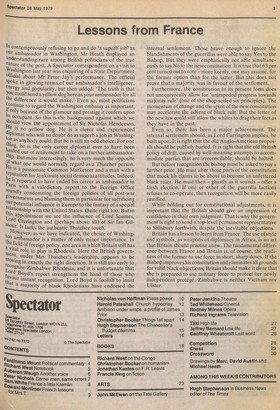Lessons from France
In contemptuously refusing to go and do 'a superb job' as our ambassador in Washington, Mr Heath displayed an understanding rare among British politicians of the true nature of the post. A Spectator correspondent on a visit to Washington last year was enquiring of a State Department Official about Mr Peter Jay's performance. The official Spoke in glowing terms of our ambassador's intelligence, energy and popularity, but then added: 'The truth is that You could send a yellow dog here as your ambassador for all the difference it would make.' Even so, most politicians Continue to regard the Washington embassy as important, I,f only because of the glamour and prestige it confers upon Its occupant. So this is the background against which we should view the appointment of Sir Nicholas Henderson. H.e is no yellow dog. He is a clever and experienced diplomat who will no doubt do as superb a job in Washington as anybody could. But he is still an odd choice. For one thing, he is the only career diplomat ever to have been hauled out of retirement to take on a further ambassadorshIP. But more interestingly, he is very much the opposite c'f What one would normally regard as a Thatcher person. He Is a passionate Common Marketeer and a man with a reputation for Jenkinsite social democrat attitudes. Indeed, he Is reported to have ended his career as ambassador in Paris with a valedictory report to the Foreign Office roundly condemning the foreign policies of all post-war governments and blaming them in particular for sacrificing "r potential influence in Europe to the fantasy of a special rel.atIonship with the United States. Quite right too. But in thIS appointment we see the influence of Lord Soames, Lord Carrington and (perhaps above all) of Sir Ian Gilmour. It lacks the authentic Thatcher touch. . However, as we have indicated, the choice of Washing'On ambassador is a matter of only minor importance. In the.fteld of foreign policy, one area in which Britain still has a vital role to play is Rhodesia. Here the British govern"lent, under Mrs Thatcher's leadership, appears to be Moving in exactly the right direction. It is still too early to re cognise Zimbabwe Rhodesia, and it is unfortunate that fad Bbyd's report strengthens the hand of those who vour instant recognition. Lord Boyd is foolish to insist that a majority of black Rhodesians have endorsed the internal settlement. Those brave enough to ignore the blandishments of the guerrillas were able to say Yes to the Bishop. But they were emphatically not able simultaneously to say No to the new constitution. It is true that 63 per cent turned out to vote —more keenly, one may assume, for the former option than for the latter. But this does not prove that a majority was in favour of the settlement.
Furthermore, the constitution in its present form does not unequivocally allow for 'unimpeded progress towards majority rule' (one of the shop-soiled six principles). The momentum of change and the spirit of the new constitution may accelerate the advent of black rule. But the letter of the new law could still allow the whites to drag their feet as they have in the past.
Even so, there has been a major achievement. The internal settlement should, as Lord Carrington implies, be built upon. It is right that the old Anglo-American proposals should be publicly buried. It is right that the old British policy of drift, caused by well-meaning attempts to accommodate parties that are irreconcilable, should be halted.
But before recognition the bishop must be asked to pay a further price. He must alter those parts of the constitution that mock his claims to be about to become an unfettered black ruler. He must then — ghastly as it sounds — offer a fresh election. If one or other of the guerrilla factions refuses to co-operate, then recognition will be more easily justified.
While holding out for constitutional adjustments, it is important that the British should give an impression of confidence in their own judgment. That is why the government is right to send a top-level permanent representative to Salisbury forthwith, despite the inevitable objections.
Britain has a lesson to learn from France. The use of style and symbols, as weapons of diplomacy in Africa, is an art that Britain should practise anew. The fundamental difference between France and Britain is, of course, the readiness of the former to use force in short, sharp doses. If the Bishop improves his constitution and eliminates all grounds for valid black objections, Britain should make it clear that she is prepared to use military force to protect her newly independent protégé. Zimbabwe is neither Vietnam nor Ulster.


































 Previous page
Previous page